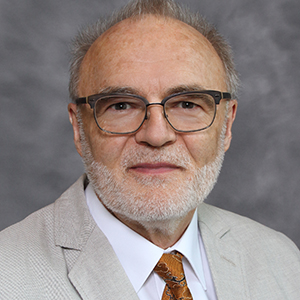Improving outcomes of multiple myeloma using TGF-beta resistant BCMA-targeted CAR T cells

Siegfried Janz
MDMedical College of Wisconsin
Project Term: July 1, 2024 - June 30, 2027
Immunotherapy using chimeric antigen receptor (CAR) T cells, or CARTs for short, holds great promise for improving outcomes and survival of patients with relapsed and/or refractory multiple myeloma (RRMM). Next-generation “armored” CARTs that can overcome transforming growth factor beta (TGF-beta) dependent immune suppression in the tumor microenvironment may provide deeper and more durable disease control than the TGF-beta sensitive CART products currently in clinical use.
"Scientific Objective: Immunotherapy has emerged as the ""fourth pillar"" of cancer treatment, complementing surgery, chemo- and radiation therapy that have dominated cancer treatment for decades. The strength and appeal of immunotherapy lie in its ability to enlist the power of a patient's immune system to attack and eliminate malignant growth in natural ways. Since immunetherapy avoids the inconvenience and toxicities of the other three pillars of cancer therapy, it has been enthusiastically embraced by patients and caregivers alike. The scientific objective of the research proposed on this occasion is in line with this enthusiasm because it pursues the development of a new immunotherapy for relapsed/refractory multiple myeloma (RRMM) – an urgent unmet medical need.
Study Rationale: A new form of immunotherapy is chimeric antigen receptor (CAR) T cells, or CARTs for short. The cells are derived from cancer patients and then grown and primed in the laboratory to kill cancer cells. CARTs are ""living drugs"" because they persist and expand after being given back to the patient. CARTs targeting a receptor protein expressed on myeloma cells known as B cell maturation antigen (BCMA) have already improved outcomes for patients with myeloma. However, in most cases, the responses are not durable and, sadly, too often followed by aggressive disease relapse that leaves few therapeutic options. The lack of durability has been attributed to various mechanisms, including the immune suppressive cytokine transforming growth factor beta (TGF-beta). This led to the hypothesis that BCMA-targeted CARTs genetically modified to resist TGF-beta may be more durable than their TGF-beta susceptible counterparts.
Point-of-care CART production: The MCW investigator team will evaluate this hypothesis by virtue of a first-in-class phase 1 clinical trial on the safety and preliminary efficacy of a BCMA-targeted CART ""armed"" with TGF-beta resistance. CART production involves the following 5 steps: (1) T cells are harvested from the patient’s blood. (2) An artificial gene that encodes the BCMA-targeted CAR and TGF-beta resistance is inserted into T cells in the laboratory. This results in expression of the CAR and a mutated TGF-beta receptor on the T cells’ surface. (3) Millions of CARTs are grown in incubators for 8-12 days. (4) The CARTs are then given to the same patient from which the T-cells were obtained by intravenous infusion. (5) The CARTs travel via the blood stream to the hematopoietic bone marrow where they recognize BCMA on myeloma cells, tightly bind to them, and eventually kill them by cytotoxic mechanisms that are well understood.
Relevance for LLS TRP’s General Topics of Particular Interest: The proposed research addresses Topic 2, titled “Development of novel therapies.” More specifically, the project evaluates a novel immunotherapy (according to section 2e) in patients with RRMM (section 2d). The project’s translational impact is deemed to be high.